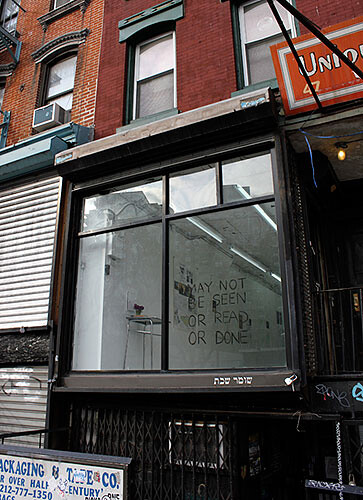When it comes to Colab, there’s not yet a definitive history. From one perspective, Collaborative Projects was an artist-run funding scheme struck up during the fabled efflorescence of late-70s downtown New York; it consisted mostly of clashing egos who tolerated one another for the sake of self-advancement and government support, and from this melee of backscratching and backbiting sprang several major careers, including those of Jenny Holzer, Kiki Smith, and Tom Otterness. From another, Colab was a model of artist-initiated collective action that devised alternatives for exhibition and film distribution; made inroads into mass media, particularly cable television; and marshaled forces in Manhattan’s intensely local struggles over tenants’ rights and urban development. No doubt, both angles possess an aspect of truth, but, for anyone convinced that present-day artistic practice plays off the past’s unfinished projects, there are considerable stakes in exploring the possibilities of the latter—just as there were stakes for the neo-avant-garde in unearthing the radical aspects of constructivism that had been buried under formalist accounts privileging Naum Gabo and Antoine Pevsner. Much as the historical revisions of the Soviet avant-garde cast Tatlin and Rodchenko as leading protagonists, a strong assessment of Colab today would likely train a spotlight on Peter Fend. After all, what pushed Colab’s politically-charged engagement with mass media farther than Fend’s selling newscasts on the Falklands War to NBC, or his report to Congress on satellite imagery analysis? Now we find Fend’s work on view in a Lower East Side markedly different from the one out of which he first emerged, a scant few blocks away from ABC No Rio and the site of “The Real Estate Show.” At times, his exhibition—titled “Über die Grenze,” after the German Ministry of Science and Technology’s deemed Fend’s proposals “out of bounds”—exudes an unwieldy grandiosity, but this much can be said unequivocally: his ambitious example raises the bar in a neighborhood of bootstrap galleries unimaginatively beholden to a trend of what Trevor Paglen has recently described as “a sort of pseudo-Greenbergian abstraction.”
On view in “Über die Grenze,” are twelve large paper sheets, each covered in maps, xeroxed documents, email print-outs, colored-pencil drawings, and handwritten notes pertaining to past or ongoing projects Fend has initiated under the legal protection of his Ocean Earth Construction and Development Corporation. Most of them are driven by ecological concerns: identifying geological instabilities at the site of the Chernobyl nuclear meltdown through satellite analysis, devising rigs for the growth and harvest of algae for bio-gas fuel, or re-drawing national boundaries around concentrations of natural resources in ocean basins. The exhibition’s format provides the grounds for an almost knee-jerk “pseudo-Greenbergian” objection: at first, any aesthetic consideration on Fend’s part seems lacking, since, for generations indoctrinated in the American middle-school education system, materials affixed to a poster-sized backing conjure science-fair associations. Yet Fend’s display presentations are hardly without precedent; indeed they closely resemble tableau arrangements of archival material documenting past performances by Vito Acconci (several of which are now enshrined in MoMA’s collection), and the late great Willoughby Sharpe (see his exhibition at Mitchell Algus Gallery in 2007). Which is to say: though Fend’s preoccupation with ecology positions him within the lineage of Land Art, the format of “Über die Grenze” suggests his practice could be better understood as akin to performance—albeit one in which the document assumes a more active role.
To be clear, Fend himself would probably object to terming his practice performance. Just look to Essex Street gallery proprietor Maxwell Graham’s memorably vigorous press release: “Fend is in business: he wants the legal contract rights he has with many experts for collaborative efforts enforced; he wants the ability to exercise his constitutional rights and duties to the fullest extent; he wants to maintain his intellectual property.” Yet the re-classification stands to transform a weakness in Fend’s approach into a strength: the tone of Fend’s handwritten comments, it must be said, comes across as unduly piqued in cataloging slights and disappointments, and almost paranoid in ferreting out conspiracies to suppress his ideas. That’s not to say Fend hasn’t met with real resistance—far from it!—but the barriers appear more structurally entrenched than vindictively erected. “Über die Grenze” purports to show scientific solutions to environmental problems, but instead it repeatedly demonstrates how supposedly ecological crises are, in fact, political ones. Think of Fend as the inverse of Christo and Jeanne-Claude. If that couple’s successful large-scale installations proved that patience and private funds could win bureaucratic approval for temporary aesthetic gestures, Fend’s perpetually stalled efforts attest to the political infighting and economic interests that block permanent ecological change. It’s performance through documents: his correspondence, official permissions, architectural plans, reports for Congress, line-item budgets, and stock prospectuses enact the inner workings of institutions and reveal their inherent flaws. As he moves from biennial to newsroom to laboratory, Fend illuminates the unwritten provisos of exhibiting, the blind spots of mainstream journalism, the deleteriously proprietary spirit of scientific research. It’s not the world-saving enterprise Fend desires, but it’s a civic service nonetheless, and a significant elaboration of Colab’s founding principles in the present day.





